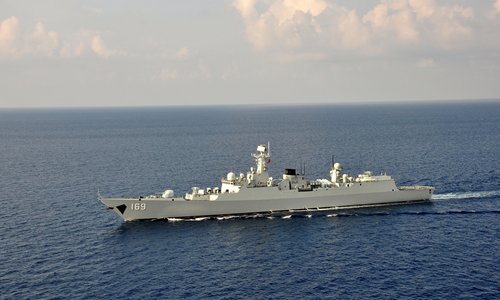US ‘navigational hegemony’ operations in S.China Sea will alienate all sides
By Wang Yinghui Source:Global Times Published: 2019/9/19 21:53:40

Chinese navy ship sails in the South China Sea. Photo: VCG
Just a few days ago on September 13, when the Chinese were celebrating the traditional Mid-Autumn Festival, it was reported that the US guided-missile destroyer USS Wayne E. Meyer entered the territorial waters of China's Xisha Islands, which was described by the 7th Fleet of the US Navy as another round of freedom of navigation operations (FONOPS). This is the second time in 15 days the ship trespassed into territorial waters of Xisha Islands, and the sixth time the US Navy conducted FONOPS in the South China Sea since the start of this year.
Li Huamin, a spokesman for the PLA Southern Theater Command denounced the US warship operation as "navigational hegemony" in a statement. He was right. The US, in the garb of challenging the "excessive maritime claims," has been carrying out FONOPS in the South China Sea for four decades. Since 2015 when the Obama administration started the operations in the South China Sea, the US Navy has conducted FONOPS in the waters more than 10 times.
After US President Donald Trump took office, he approved a plan to give the US Navy more freedom to carry out patrols in the South China Sea. In the more than two years of Trump's term, FONOPS have increased significantly both in frequency and intensity. The so-called freedom of navigation operations have been conducted not only around Nansha Islands, but also Xisha Islands.
In order to restrain China's "aggressiveness," the US has also cranked up other military activities in the South China Sea, including holding joint exercises with its allies, increasing deployment of advanced weapons to the region and providing military assistance to other claimant countries.
Notably this year, the US has increased its Coast Guard presence in the South China Sea, and deployed a new updated littoral combat ship to the Changyi Naval Base in Singapore in July following a 19-month hiatus.
The US is an external power in the South China Sea. However, it has been meddling in the South China Sea issue, causing instability and tensions in the region and complicating the problem. China and ASEAN countries have reached a consensus on resorting to diplomatic means in solving the South China Sea disputes, and have been progressing significantly in the Code of Conduct (COC) negotiations.
Both sides have proved that the territorial disputes could only be dealt with well between China and the claimants themselves, and peace and stability in the South China Sea will be maintained with joint efforts of China and ASEAN, without intervention of external powers.
The US will find that FONOPS, in essence, the "navigational hegemony" operations, are not working. And its other intimidating military activities in the South China Sea also prove futile. For one thing, China has not backed off in the face of the US flexing muscles, and remains firm in safeguarding its territorial integrity and sovereignty. For another, ASEAN countries have not been estranged from China as a result of the US trying to drive a wedge.
Countries in the region have been increasingly realizing that it is not wise to side with the US to balance China. On the contrary, the regional countries have been more closely working with China in the fields of economy, counterterrorism and non-traditional security issues.
In the end, the "navigational hegemony" is doing no good to the peace and stability of the region, and harming the US pursuit of an "open and free" Indo-Pacific. It is even hurting the "rule-based" order declared by the US itself. The foremost thing for the US right now is to restrain its hegemonic mind-set and behavior, and promote regional peace and cooperation, rather than make trouble in the region.
The author is an associate professor with National Security College of the National Defense University. opinion@globaltimes.com.cn
Posted in: ASIAN REVIEW,CHINA-US